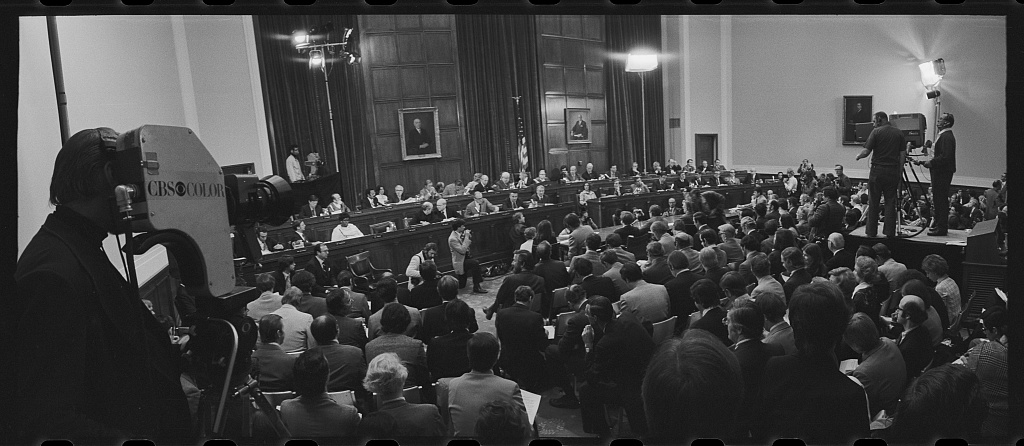
First day of the House Judiciary Committee’s formal impeachment hearings against President Nixon, May 9, 1974. Source: Wikipedia.
Once President Joe Biden announced his withdrawal as a candidate last month, Democrats predictably gushed over his public-spirited decision to put country before self-interest. Ezra Klein, who had urged Biden to step aside back in February, wrote that Biden’s choice made him “an actual hero.” In his Oval Office address, Biden said his choice was in service of “the defense of democracy,” which is “more important than any title.” This paper-thin cover story, meant to help Biden transition into a party-unifying mascot, may or may not pass into the history books, but it is utterly untrue. Biden intended to stay in the race and was only persuaded to bow out by threats of open warfare from his partisan allies. He stepped down because he lost his party’s support.
When President Richard Nixon announced his resignation on August 8, 1974, he was refreshingly straightforward about his reason. He said that he wished to fight through to the end, but “it has become evident to me that I no longer have a strong enough political base in the Congress to justify” such an effort. Even so, he framed his resignation as an act of self-sacrificing statesmanship:
I have never been a quitter. To leave office before my term is completed is abhorrent to every instinct in my body. But as President, I must put the interests of America first. America needs a full-time President and a full-time Congress, particularly at this time with problems we face at home and abroad.
Notwithstanding his opening realism, this was still self-flattery. Nixon resigned because it became clear to him that he would soon be America’s second president to be impeached by the House of Representatives and then the first to be convicted by the Senate.
One might feel some gratitude that Nixon spared the country a drawn-out reckoning. But, then again, one might regret that he cheated the constitutional hangman and thus sapped the episode of some of its precedential force. Since the congressional process was truncated, when Watergate passed into historical consciousness, the heroes of the story were Woodward and Bernstein and their mysterious source, Deep Throat, rather than Senator Sam Ervin (D., N.C.) and Representative Peter Rodino (D., N.J.).
The forgetfulness about Congress’s role is especially unfortunate in light of impeachment’s transformation in the past quarter century. As the Watergate scandal first emerged, both the House and Senate investigated the incident without any thought of impeachment. When Rodino, the new and unheralded chairman of the House Judiciary Committee, eventually opened an impeachment inquiry, he could credibly claim that he did so with a sense of regret. He built a bipartisan staff to painstakingly sift through the evidence and craft a full picture of the White House’s activities. Rather than seeking publicity, they rigorously avoided the press and put off frustrated liberal Nixon critics for as long as possible all while demonstrating an almost unbelievable capacity to avoid leaks. Their work (which relied heavily on the investigative work already done by the Senate and special prosecutor) was genuinely persuasive, convincing eight of the 17 Republican members of the committee that Nixon’s pattern of behavior was incompatible with his constitutional duties. The committee’s vote set the stage for impeachment, such that Nixon had no choice but to leave when things got even worse after the release of the “smoking gun” tape.
The 1974 House Judiciary Committee exemplified how high principles can be put into action, thereby invigorating the national legislature. But latter-day impeachments (of President Bill Clinton, twice of President Donald Trump, and finally of Secretary of Homeland Security Alejandro Mayorkas) have taken a quite different course. All were exclusively partisan affairs from their beginnings. In each case, the president’s co-partisans made it clear that the only appropriate response to impeachment was maximal standoffishness, with conviction in the Senate being an almost unthinkable outcome.
Some contemporary observers are tempted to conclude that it was 1970s Republicans who got this wrong — that their failure to defend Nixon shows that they did not understand the game being played. After all, was Nixon any rougher than Lyndon Johnson? But focusing too much on personal fairness misses the point: In 1974, American elected officials were determined to uphold a standard of conduct that Nixon’s reckless activities flagrantly and publicly offended. Whether the problem was the “publicly” or not, the embarrassment to the office of the presidency existed all the same.
The “resurgent” Congress after Watergate made a lot of mistakes as it sought to bring the executive branch to heel. But from the vantage point of 2024, what is most striking is how much the legislature was able to think and act institutionally in the wake of deposing the president. “Watergate” became a metonym for the loss of public trust (largely attributable to the war in Vietnam). But the post-Watergate Congress also stood for the idea that the adaptability of American government made it equal to the challenges of the Cold War world. Rather than just hunkering down, our representatives experimented with new mechanisms of accountability. Today, with presidential and executive power once again unbalancing our system, we would do well to recover that spirit of 1974.
Philip Wallach is is a senior fellow at the American Enterprise Institute and author of Why Congress (2023). . This article was first published by National Review.
Stay in the know about our news and events.